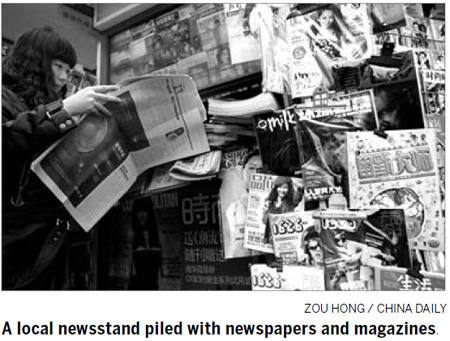Surviving media jungle at Internet age
(China Daily)
Updated: 2010-03-01 13:21
 |
Large Medium Small |

As part of China Daily's aggressive strategy to boost its presence at home and abroad, METRO Beijing has just been relaunched with significantly more pages and reporting.
At a time when the news about papers is all doom and gloom half a world way, readers may be a little bewildered by the robust local media scene. With a resident foreign population of about 110,000, the city already publishes half a dozen English newspapers and magazines. There is a general consensus that in the West, newspapers' heyday is already over as they enter the decline phase of their product life cycle. But will newspapers in China be immune from the laws of media economics?
No, they won't. Some Chinese pundits have already forecast that due to an Internet-enabled freefall in readership and ad revenues, by 2025 market-driven newspapers will become an endangered species in China and only a very small number of "quality" newspapers will survive.
The capital used to be a battleground for cut-throat competition among a dozen Chinese-language metropolitan dailies.
But now the local market is dominated by about four morning or evening newspapers that are fighting for a declining readership eroded by Internet.
To make their life even more difficult, newspapers in China generally allow their nemesis news portals to scoop their content at dirt cheap prices or for free.
In China, newspaper alliances that target news portals have been formed and collapsed over and over again, because there are always some newspapers that want the aggregators to help them capture larger shares of the market.
The English media will be no exception. Each will need to provide essential coverage that differentiates itself from the pack. Even without the Internet, no traditional media would be able to survive, if they don't produce differentiated content that makes their product unique and sustainable.
At the same time, local English news media will need to integrate themselves with Web technologies. METRO will try to increase the "stickiness" of its website by encouraging its dynamic journalists, including those print-hardened ones, to become Internet-savvy and interactive.
There will be also be other major challenges for any State media when attempting to develop viable content and business models for sustained development.
As State media, we will probably always meet skepticism from foreign readers, because the independent press is a central feature of the dominant value system in the West. We're aware that if communication goes against one's aspirations, values and motivations, it is likely not to be received at all or at best, to be resisted, as management guru Peter Drucker once said.
METRO will uphold universal professional journalism standards as we strive to be timely, accurate, complete, objective, balanced and fair.
When dishing up local news and views, we don't avoid reporting sensitive issues in our extensive coverage of the city. Readers will also find a diversity of opinions as we encourage debate on a combination of print and Web platforms.
It may sound an arduous task. But we're following the official guidelines for effective reporting. That is, news must be close to readers, reality and life.
It's hard to know whether and when the Internet will kill off newspapers.
But it's obvious a newspaper will die sooner rather than later, if it provides mundane content and refuses to embrace new communication technology.
And we believe a newspaper that practices good journalism will have better chances to survive, as it might have more time to tap into the potential of the Web and experiment with new print mode.
The writer is METRO's Editor. Contact him by e-mail at yuanzhou@chinadaily.com.cn.